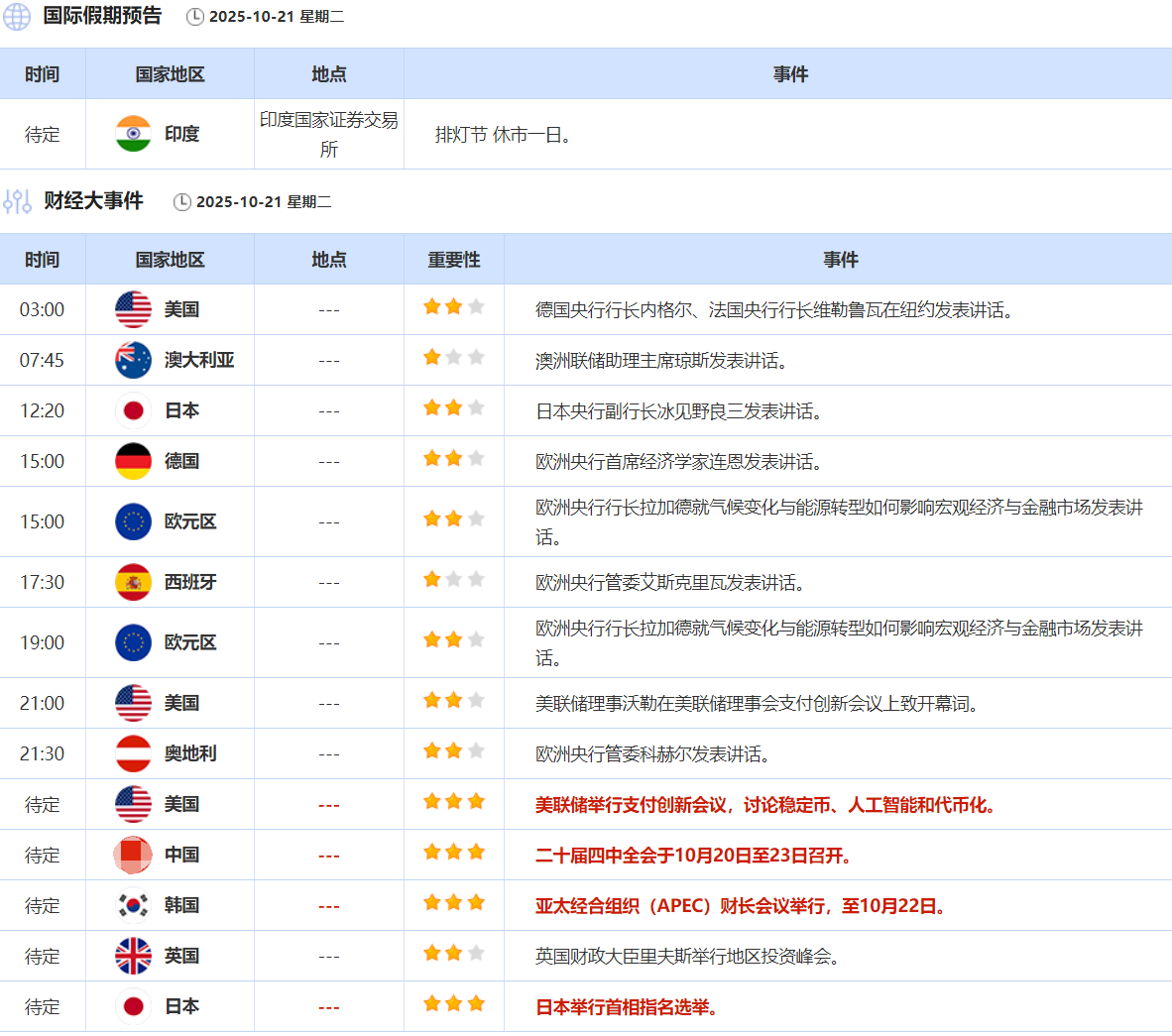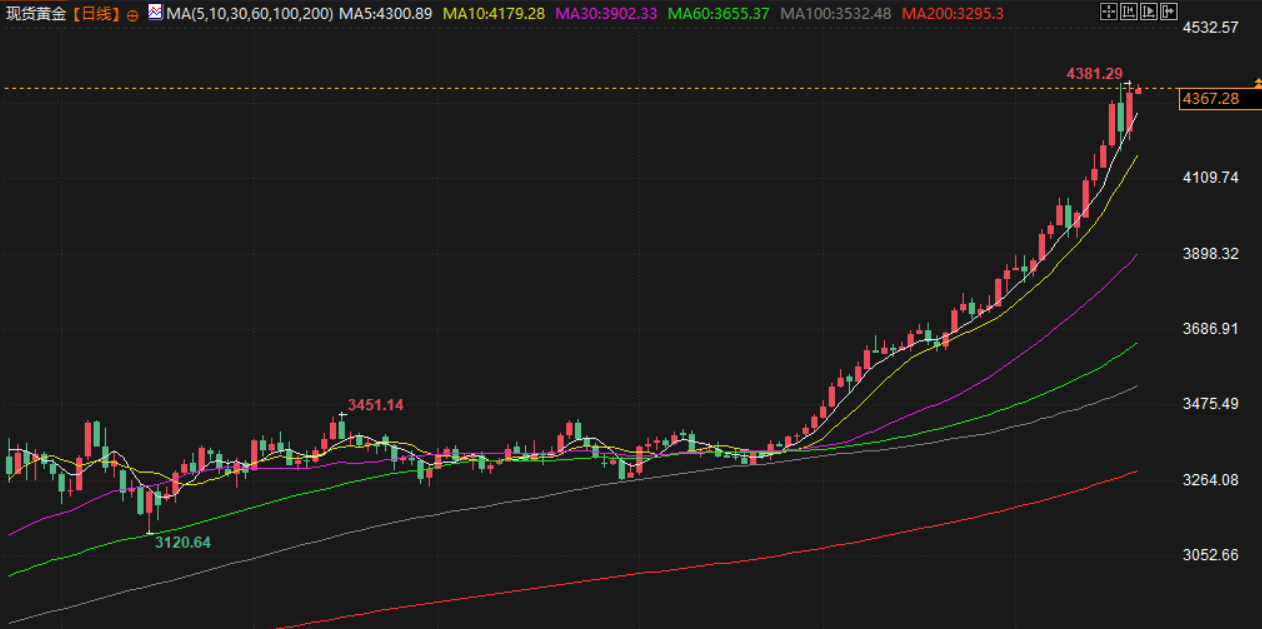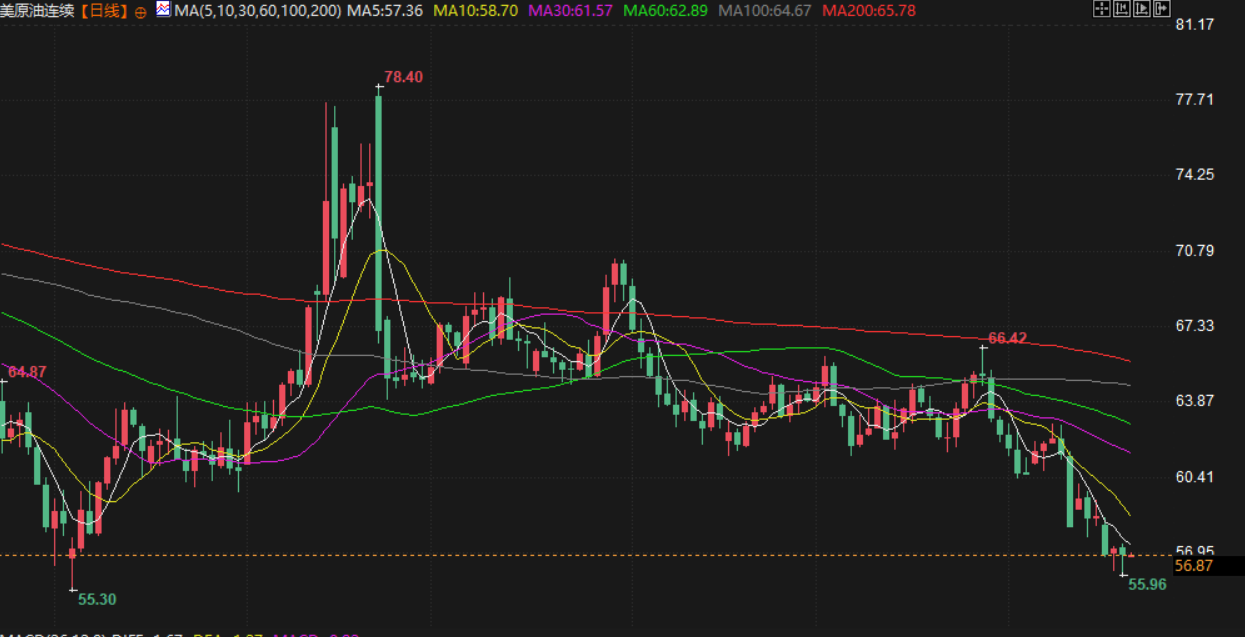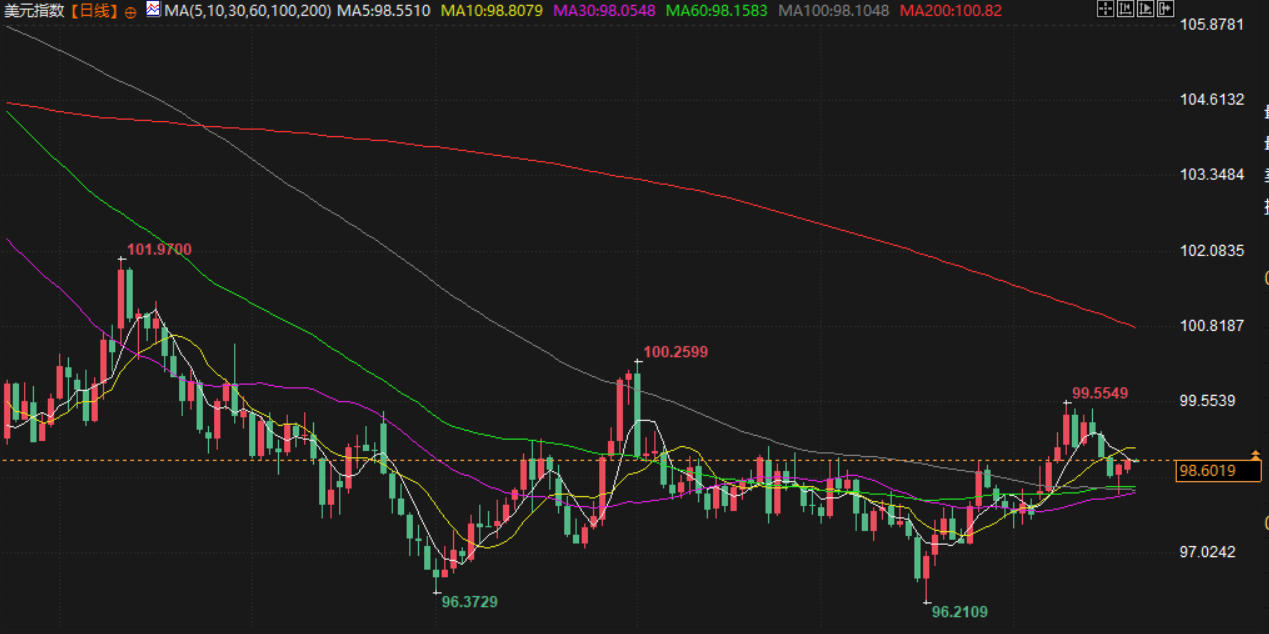October 21st Financial Breakfast: The 11th US Senate government shutdown vote failed to pass, gold prices rebounded and approached 4400, and oil prices hit a 5-month low
2025-10-21 07:26:26

Focus on the day

Canada's CPI data.
stock market
U.S. stocks jumped on Monday, with financial and technology shares providing most of the gains, as upbeat quarterly earnings results revived risk appetite and investor concerns about the credit quality of regional banks eased.
The broad-based rebound sent all three major U.S. stock indices sharply higher. The Russell 2000 index of small-cap stocks outperformed its large-cap peers, rising 2.0%.
"It's been a good, solid, well-rounded move," said Paul Nolte, senior wealth advisor and market strategist at Murphy & Sylvest. "There's not a lot of negativity in the market, and financial stocks are seeing a relief rally as investors think maybe last week's sell-off was overreacted. As far as the market is concerned, things are looking up again."
Apple shares hit a new all-time high, while Meta, Netflix, and Alphabet rose between 1.3% and 3.3%. The Philadelphia Semiconductor Index broke through a record high and closed up 1.6%.
Third-quarter earnings season is in full swing. Notable reports this week include Tesla, Netflix, IBM, Intel, GM, and Ford, along with a host of other high-profile industrial companies, including aerospace, transportation, and diversified manufacturers.
Following last week's sharp sell-off on concerns about systemic credit stress, upcoming earnings reports from U.S. regional banks are expected to provide a closer look at the sector.
Analysts now expect S&P 500 third-quarter earnings to grow 9.3% year-over-year, an improvement from the 8.8% growth projected on October 1st.
"A lot of the uncertainty that businesses were worried about earlier this year — tax legislation, tariffs — has subsided for now, allowing them to focus on earnings and profitability," said Matthew Keator, managing partner of the Keator Group.
White House economic adviser Kevin Hassett said the federal government shutdown is likely to end this week, which provided an additional boost to market sentiment.
As the federal government shutdown enters its 20th day, investors and policymakers are having to navigate the resulting data blackout. But Friday, the Labor Department will make an exception and release September's Consumer Price Index (CPI), which will provide the data-dependent Federal Reserve with a glimpse into inflation and perhaps shed light on the extent to which President Trump's tariffs are impacting price growth.
The Dow Jones Industrial Average rose 1.12% to 46,706.58 points; the S&P 500 rose 1.07% to 6,735.13 points; and the Nasdaq rose 1.37% to 22,990.54 points.
Of the 11 major sectors in the S&P 500, communication services saw the biggest gains, while consumer staples and utilities were lower.
In other stock moves, Boeing rose 1.8% after receiving approval from the U.S. Federal Aviation Administration to increase monthly production of the 737 MAX to 42.
WeightWatchers shares surged 9.3% after the company announced it would partner with Amazon to deliver weight-loss medication.
Gold Market
Gold prices rose more than 2% on Monday, supported by expectations of further U.S. interest rate cuts and continued safe-haven demand, while investors awaited upcoming trade talks and U.S. inflation data due this week.

Spot gold hit another all-time high of $4,381.29 an ounce. U.S. gold futures for December delivery closed up 3.5% at $4,359.40 an ounce.
Jeffrey Christian, managing partner of CPM Group, said that political and economic concerns have driven gold prices to rebound after a sharp drop last Friday. We expect gold prices to rise further in the coming weeks and months, and it would not be surprising if it soon rises to $4,500 an ounce.
The U.S. government shutdown, which has stretched into its 20th day after the Senate failed in its tenth attempt to break the deadlock last week, has also delayed the release of key economic data, leaving investors and policymakers in a data vacuum ahead of next week's Federal Reserve meeting.
U.S. Consumer Price Index data, delayed by the government shutdown, is expected on Friday. Meanwhile, traders are betting on a 99% probability of a Federal Reserve interest rate cut next week, with another reduction expected in December.
Investors are also watching for further progress in trade negotiations. Christian said, "I wouldn't be surprised to see gold prices reach $5,000 per ounce sometime next year." This would depend on whether political issues persist or even worsen, which is exactly what we are facing. Spot silver rose 0.6% to $52.17 per ounce, having hit an intraday record high of $54.47 on Friday before ultimately falling 4.4%. Among other precious metals, platinum rose 1.9% to $1,640.90 per ounce, while palladium rose 1.5% to $1,496.59 per ounce.
Oil Market
Oil prices settled on Monday at their lowest level since early May as investors weighed the potential for a global supply glut, coupled with trade tensions fueling concerns about an economic slowdown and weak energy demand.

Brent crude futures settled down 0.46% at $61.01 a barrel, while U.S. crude futures fell 0.03% to $57.52 a barrel. Both benchmarks fell by more than $1 at one point, ultimately closing at their lowest levels since early May.
Judging from the futures structure of global benchmark Brent crude, traders' concerns have shifted from insufficient supply to oversupply.
The six-month spreads for both Brent and WTI futures show that near-term contracts are trading at a discount to those for later delivery, a structure known as contango, which encourages traders to store oil so they can sell it at higher prices when supply tightens. Brent crude entered contango last Thursday, the first time since a brief appearance in May, and is currently trading at its highest premium since December 2023. WTI entered contango last Friday, the first time since January 2024.
“Oversupply concerns are sweeping the market, especially looking ahead to 2026,” said John Kilduff, partner at Again Capital. “We’re going to see floating storage rise and inland tanks fill up. It’s a truly bearish narrative we haven’t seen in a long time,” he added.
Limiting the decline in oil prices to some extent was news that a lobbying group whose board members include Oracle, Amazon and ExxonMobil is urging the Trump administration to immediately suspend the implementation of the "related-party rule," saying the rule has stalled billions of dollars in U.S. exports and could prompt other countries to exclude U.S. companies from their supply chains.
Further pressuring prices, a preliminary survey on Monday showed U.S. crude inventories likely rose last week.
foreign exchange market
The dollar edged higher against the yen on Monday as investors turned their attention to political developments in Japan and the eurozone, while concerns about U.S. credit risks persisted.

The yen edged lower as hardline conservative Sanae Takaichi was all but certain to win a parliamentary vote to become Japan's first female prime minister.
Expectations that Sanae Takaichi will become the new prime minister have fueled market concerns about potential fiscal expansion, potentially depressing the yen further. Lee Hardman, senior forex economist at MUFG, said market participants will closely monitor the fiscal plans proposed by the new coalition government. The dollar rose 0.08% against the yen to 150.710 yen.
The yen received some support after Bank of Japan board member Sojiro Takada reiterated on Monday his support for resuming interest rate hikes after voting against keeping rates unchanged in September. Japan's benchmark Nikkei average closed up more than 3% at a record high.
The Bank of Japan will hold its policy meeting on October 30, and data from the London Stock Exchange Group (LSEG) shows that the market implied probability of a 25 basis point rate hike is 23%.
The euro rose slightly against the dollar as political tensions in France eased, but investors remained cautious. The market has not yet fully priced in political risks in France, and the government's decision to freeze pension reforms only provides a temporary respite. The euro was trading at $1.164, down 0.06%.
The dollar index, which measures the greenback against a basket of major currencies, rose 0.053% to 98.587. The index had hit 98.025 last Friday, its lowest level since October 6. David Morrison, senior market analyst at Trade Nation, said in a report that the immediate danger appears to have passed, with investors confident that bankruptcies, bad debts, and fraud allegations are isolated incidents rather than systemic problems in the banking industry. Economists noted that the dollar's resilience will be tested on multiple fronts.
Klaus Baader, global chief economist at Societe Generale, said: "First, the government shutdown is directly and indirectly hurting economic activity, and trade tensions are the second biggest concern. Third, the impact of implemented (import) tariffs continues to be felt, dragging down real household income growth and compressing corporate profit margins."
Barclays noted that with no clear catalyst to end the federal government shutdown in the coming weeks, it is likely to continue until November, when political and economic pressures will intensify.
The Australian dollar rose 0.48% to $0.652 against the U.S. dollar on Monday as data showing the Asian giant's economy was somewhat resilient to tariffs boosted market sentiment.
International News
The U.S. Senate voted on the appropriations bill for the 11th time but still failed to pass the government shutdown
On October 20, local time, the U.S. Senate voted on a government funding bill for the 11th time but still failed to pass it, thus continuing the U.S. government shutdown that began on October 1. The bill, which was originally intended to extend government funding until November 21, ultimately failed to reach the 60 vote threshold required for passage, with 50 votes in favor and 43 votes against.
U.S. Nuclear Safety Administration begins mandatory furloughs
The U.S. federal government shutdown is nearing its third week. On October 20th, the National Nuclear Security Administration, a key agency responsible for managing the nation's nuclear weapons stockpile, began furloughing most of its employees. This marks the first time the agency has faced such a situation since its inception.
Federal Reserve spokesperson: US bank reserves have fallen to a critical level
Nick Timiraos, a spokesperson for the Federal Reserve, said that as the U.S. Treasury rebuilds its cash balance, the ratio of bank reserves to bank assets has recently fallen below 13%. New York Fed President Williams previously regarded this level as the critical point of "ample" reserves.
The EU has not reached a new consensus on issues such as sanctions against Russia
The European Council meeting was held in Luxembourg on the 20th, focusing on the latest developments in the Russia-Ukraine conflict. No new consensus was reached on key issues, including a new round of sanctions against Russia and the use of frozen Russian assets to support Ukraine. Furthermore, some EU member states expressed dissatisfaction with the US-Russia summit in Budapest, Hungary, calling the invitation of a Russian leader to Europe "unbelievable." On the same day, Hungarian Prime Minister Orbán stated on social media that a US-Russia meeting in Budapest was in Hungary's interests. However, he emphasized that Hungary would not invite EU leaders who advocated for war to participate. (CCTV News)
The US is reportedly delaying the G7's plan to expand the use of Russian assets, and the EU's aid plan for Ukraine has been thwarted.
According to people familiar with the matter, the United States has expressed reservations about a European Union (EU) plan for the Group of Seven (G7) to expand the use of frozen Russian assets to support Ukraine. U.S. officials told their European counterparts during an International Monetary Fund (IMF) meeting in Washington last week that they would not join the initiative for now, according to people familiar with the matter. One person said the U.S. side cited market stability risks as a reason for hesitation, while another said the U.S. was simply noncommittal at this stage. This move is a setback for the EU, which has been trying to get other G7 members to join its plan to secure up to €140 billion (US$160 billion) in loans for Ukraine, secured by frozen Russian central bank assets. The European Commission is developing detailed proposals for the mechanism, but they will not be released until EU leaders approve it, possibly at a summit in Brussels later this week. The U.S. hesitation comes as the White House is renewing its push to end the Russia-Ukraine conflict. U.S. President Trump met with Ukrainian President Volodymyr Zelensky in Washington last week and, following a phone call with Russian President Vladimir Putin, announced plans to meet with Putin in Budapest soon.
Japan's House of Representatives and House of Councillors to hold elections for prime minister nomination
On the 21st, local time, the House of Representatives and the House of Councillors of Japan's Diet will hold elections to nominate the new prime minister. Given that the Liberal Democratic Party and the Japan Restoration Party have reached an agreement on a coalition government, and the opposition parties have yet to agree on a unified candidate, LDP President Sanae Takaichi is likely to become Japan's new prime minister and form a cabinet. (CCTV News)
France has lost two AA international sovereign ratings and is still at risk of a downgrade in the future
On October 17, S&P Global Ratings downgraded France's foreign and local currency long- and short-term sovereign credit ratings from "AA-/A-1+" to "A+/A-1," with a stable outlook. This marks the second downgrade of France's sovereign rating by an international ratings agency in recent times. On September 12, Fitch also downgraded France's sovereign rating to "A+" with a stable outlook. Bloomberg analysts suggest that France's loss of double-A ratings from two major international credit rating agencies could force some funds with extremely stringent investment standards to sell French bonds.
Trump adviser: If the government shutdown does not end this week, tougher measures may be taken
The U.S. federal government shutdown entered its 20th day, and a senior economic adviser to President Donald Trump suggested that "tougher measures" could be in the works if it doesn't end this week. Kevin Hassett, director of the White House National Economic Council, told CNBC on Monday that unless Democrats set aside their demands on healthcare and support a federal spending package, "the White House is going to have to seriously consider" taking "tougher measures." Following the weekend's "No King" protests, Hassett also suggested the shutdown could end this week and predicted moderate Democrats would now be more likely to agree to fund the government. He offered no evidence that the impasse was about to end.
Domestic News
National Bureau of Statistics: The main tone of stable economic operation has not changed
In response to reporters' questions about the national economy in the first three quarters of 2025, a spokesperson for the National Bureau of Statistics stated that the main tenet of stable economic operation remains unchanged. Economic growth, employment, prices, and the balance of payments are the most important macroeconomic indicators for observing economic performance. In terms of economic growth, GDP grew by 5.2% year-on-year in the first three quarters, accelerating by 0.2 and 0.4 percentage points compared to the previous year and the same period last year, respectively. Economic growth reached 3.9679 trillion yuan, an increase of 136.8 billion yuan year-on-year. Maintaining stable development is exceptionally difficult for an economy as large as my country, and is even more valuable given the complexities of various risks and challenges. Regarding employment and prices, the national urban surveyed unemployment rate averaged 5.2% in the first three quarters, the same as in the first half of the year. The consumer price index (CPI), while slightly down by 0.1% year-on-year, rose by 0.6% in the core CPI, excluding food and energy, with a 1.0% increase in September, marking the fifth consecutive month of growth, reflecting the effectiveness of policies to expand domestic demand and boost consumption. From the perspective of the balance of payments, foreign trade demonstrated strong resilience, with imports and exports reaching record highs for the same period, and growth rates recovering quarter by quarter. At the end of September, foreign exchange reserves remained above US$3.3 trillion, and the RMB exchange rate remained stable with some appreciation. Key physical volume indicators also maintained steady growth. In the first three quarters, power generation by industrial enterprises above designated size increased by 1.6% year-on-year, while freight and passenger turnover increased by 4.8% and 4.4%, respectively.
- Risk Warning and Disclaimer
- The market involves risk, and trading may not be suitable for all investors. This article is for reference only and does not constitute personal investment advice, nor does it take into account certain users’ specific investment objectives, financial situation, or other needs. Any investment decisions made based on this information are at your own risk.





















